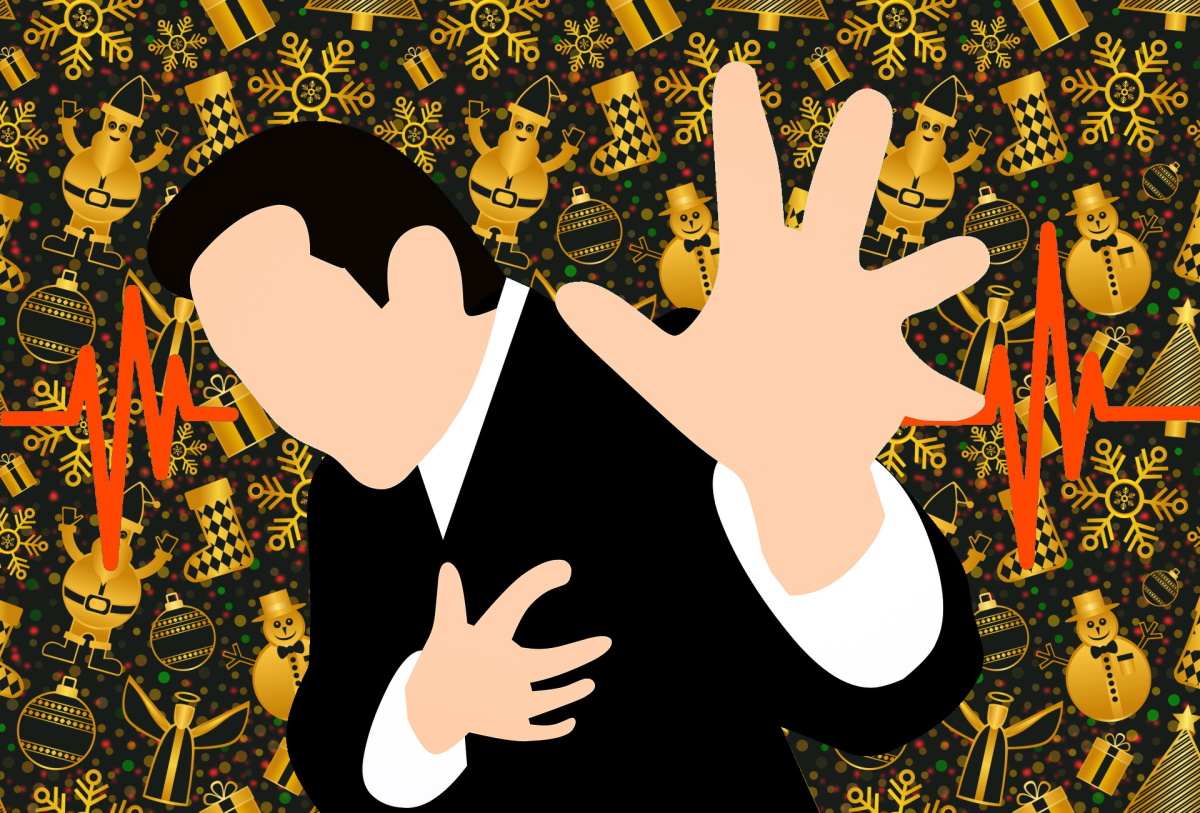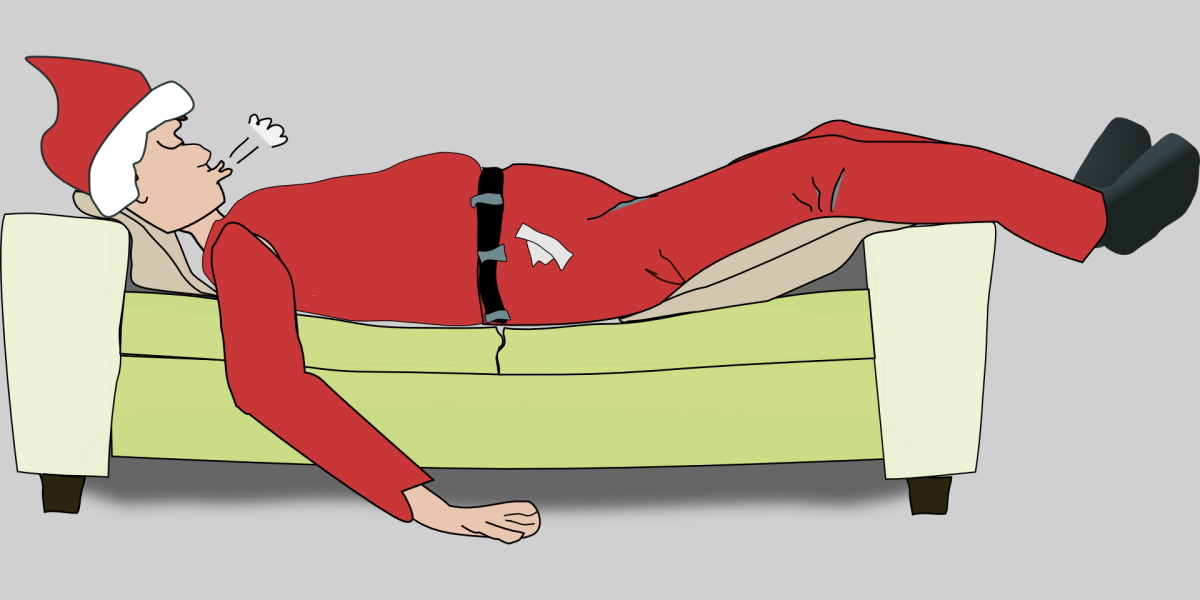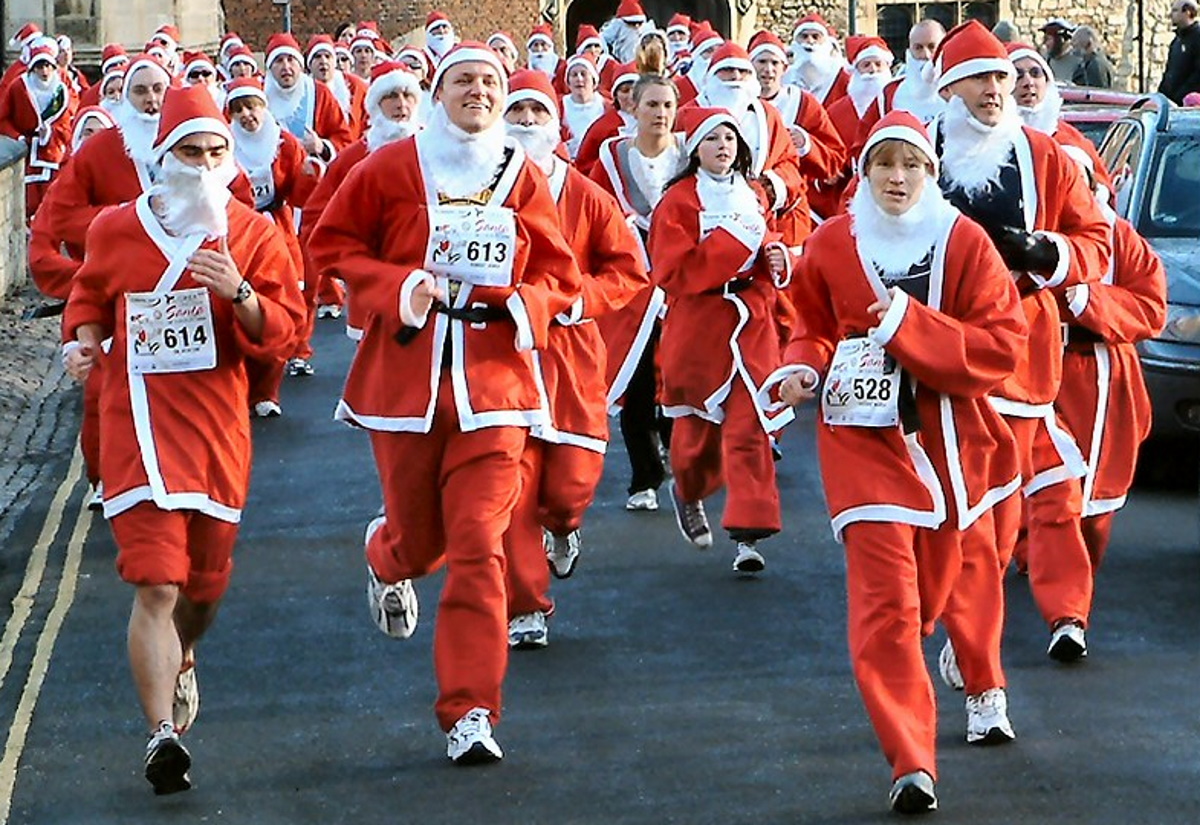Christmas Gift Ideas for Longevity Enthusiasts
5 low-cost gifts for anyone who wants to live a longer, healthier life
Join the club for FREE to access the whole archive and other member benefits.
"…They would feast on Who-pudding and rare Who-roast-beast
Which was something the Grinch couldn’t stand in the least."
- How the Grinch Stole Christmas by Dr. Seuss
Perhaps Dr. Seuss’s Grinch did have the right idea about Christmas festivities after all. With a heart that was two-sizes too small – a sure sign of cardiomyopathy – the Grinch, in the real world, would have been advised by his doctor to avoid most of the admittedly delicious, but unhealthy holiday foods.

But most of us, unlike the Grinch, do love the holiday food, fun, and festivities. And at a time like this, controlling your diet or keeping to healthy habits is the last thing on your mind. You’ve worked hard all year, met your health goals (mostly), and now it’s time to relax and enjoy some lazy indulgence. What could go wrong?
Unfortunately, according to several studies, plenty could go wrong.
The holidays, which are traditionally a time for families and friends to get together, party, eat, drink, and be merry, are also peak heart attack season. So much so, that one group of researchers have labelled heart incidents during this time of year as ‘Merry Christmas Coronaries’ and ‘Happy New Year Heart Attacks’.
Over a 12-year period, it was found that the numbers of deaths due to heart attacks during December and January were 30% higher than those from June to September (in a study focused on Los Angeles county). Another longer-term study that covered estimates across the USA and included other illnesses, also came to the same conclusion; that an increase in heart attack cases starts around Thanksgiving and peaks twice – one on Christmas, and the other on New Year’s Day.

At first, it was thought that the cold weather was a major factor in this phenomenon, as low temperatures can cause heightened blood pressure and abnormal hemostasis (where blood clots form inside blood vessels), vascular resistance (where the blood vessels lose their flexibility and become stiffer), and coronary vasospasms (a temporary tightening of the blood vessels in the heart). But deeper analysis revealed that this may not be so.
Topmost on the list of reasons for medical heart emergencies during Christmas and New Year are overindulgence in high-salt and high-fat food and alcohol coupled with emotional stress, and interestingly, a reluctance to seek medical help.
Since the holidays are a time when you get to reconnect with the people in your lives whom you’d usually not meet on a regular basis, this obviously leads to celebratory eating and drinking. And celebratory foods, as we know, include lots of red meat, are highly processed, and often contain humongous amounts of sugar, fat, and salt. The intake of such foods is linked to a score of chronic health conditions such as obesity, diabetes, heart disease, and cancer. A recent study estimates that eating both, processed and unprocessed red meats, are associated with higher risks of premature death. Eating ultra-processed foods have also been linked to earlier and steeper cognitive declines and earlier onset of dementia, especially in older adults with chronic health problems.
Diets high in calories – especially those coming from sugars and fats – are associated with early ageing in a variety of organisms. Starting from single-celled yeasts to minute flies to mice, rats, and apes, there is ample evidence to show that high calorie diets cuts lives short.
Similarly, evidence is now piling up to indicate that although very light drinking (mostly red wine) might protect against heart diseases and diabetes, excessive or even moderate alcohol intake can be unhealthy. Alcohol intake can not only weaken the liver, heart, and immune systems, but is also linked to obesity, diabetes, insomnia and dementia. For people over 65 years of age, it can have serious effects on balance and coordination and hence, increases the chance of a bad fall; falling is the leading cause of injury-related deaths in older people.
Apart from overindulgence, the holidays also encourage sedentary habits. Who wouldn’t want to snuggle on the couch with a cozy blanket, hot cocoa, perhaps a fragrant wood fire, and watch something on TV (or perhaps Netflix or Hulu or DisneyPlus) all day? In addition, the holiday season wouldn’t be the holiday season without some late-night partying, right?

But it is exactly these indulgences that also contribute to health emergencies during the holidays. Sedentary behavior is known to not only cause unhealthy weight gain, but also affect the heart, lungs, and muscles negatively. Late nights and sleep deprivation encourage sedentary behaviors during the day which generates a vicious cycle that could lay the foundation for poor daily routines. Once the holiday season wears off, getting back to a regular, healthy routine can be quite difficult. In addition, research shows that just a single night of insufficient sleep can make an older adult’s cells age faster. This promotes inflammation and increases the risk of developing diseases such as cancer, multiple sclerosis, and the most common cause of death in older adults – heart disease.
Together, the unhealthy holiday diet and sedentary behavior, coupled with late night partying can not only devastate physical health, but will also take a toll on mental health by causing or worsening anxiety and depression.
Adding to these mental burdens, is the social stress caused by the ‘festive workload’. While this may sound strange, festive workload is very much a factor that dampens the holiday spirit. Festive workload is having to host and attend parties, shop for presents, decorate, and budget for all the extra expenses that come with these social requirements. Many times, this causes far more stress than one faces on a regular work schedule.
Apart from the festive workload, there’s also the holiday blues – the loneliness and depression that descend upon some during this season for a variety of reasons. One could simply be physiological – the bleak cold weather and lack of sunlight can change our biological clocks or lower serotonin (a chemical in our brain that contributes to feelings of happiness) levels and stimulate melatonin (another brain molecule that induces sleepiness), leading to feelings of sadness and in worse cases, depression. Another reason could be loneliness. Perhaps you’re away from family, friends, or loved ones because you simply cannot travel to see them because of monetary, health, or other reasons. In other cases, your self-criticism may be in overdrive as you see others as more ‘perfect’ than yourself. But whatever the reason, the holiday blues do contribute to the rise in heart problems seen during Christmas and New Year.
So, what can you do to keep yourself safe from becoming another statistic in the holiday season mortality chart?
One step would be to keep to a relatively healthy diet – avoid too much alcohol, processed meats, and dishes high in processed wheat, salt, and sugar. Also, not all holiday foods are unhealthy. Something as simple as staying hydrated and including enough fresh fruits, vegetables, and nuts in your diet can have vast beneficial effects. Loading up on seasonal fruits like cranberries and oranges (rich in antioxidants); vegetables like brussels sprouts, green beans, and broccoli (rich in fiber and vitamins); and fresh white meats like salmon and turkey, can help you stay fit. There are even healthy options for desserts – cheesecakes, pies, yogurt ice creams, and dessert bars that are low fat, sweetened with honey or maple syrup, and packed with protein and probiotics.
Another step would be to ensure that you get some exercise daily. This doesn’t necessarily have to mean hitting the gym. You could burn quite a few calories by going for a short winter hike with family and friends or just having a snowball fight! Even long, relaxed walks after every meal could be beneficial. These can not only help you keep physically active but can also help you socialize and bond with your loved ones.

If you’re far from your usual friends or family circle, perhaps joining a local carol singing group could help boost your mood and give you a chance to make new friends. Group singing activities not only have physical health benefits like strengthening lung muscles, but also lower levels of anxiety and stress. If being social doesn’t help with the holiday blues, something as simple as a bright light therapy lamp could make you feel better.
And if it helps you stay healthy, be a bit of a Grinch! Avoid that high-calorie pudding and roast! Hit the snooze button to get some more sleep even if it means missing out on some holiday activities! Fulfil your social obligations but prioritize your energy levels and health. Say no to extra responsibilities if it brings you more peace of mind. But perhaps most important of all, be kind to yourself – do not dismiss your health or feelings during the festive season. Get medical help if you feel something is wrong.
It is important to realize and accept that not every Christmas or New Year will be perfect. What’s essential is that you stay healthy enough to be able to see the next one.
Blog written by Anusha Krishnan
1) Kloner, R.A., 2004. The “merry Christmas coronary” and “happy New Year heart attack” phenomenon. Circulation, 110(25), pp.3744-3745. https://www.ahajournals.org/doi/full/10.1161/01.cir.0000151786.03797.18
2) Phillips, D.P., Jarvinen, J.R., Abramson, I.S. and Phillips, R.R., 2004. Cardiac mortality is higher around Christmas and New Year’s than at any other time: the holidays as a risk factor for death. Circulation, 110(25), pp.3781-3788. https://www.ahajournals.org/doi/10.1161/01.CIR.0000151424.02045.F7
3) Phillips, D., Barker, G.E. and Brewer, K.M., 2010. Christmas and New Year as risk factors for death. Social science & medicine, 71(8), pp.1463-1471. https://pubmed.ncbi.nlm.nih.gov/20805014/
4) Etemadi, A., Sinha, R., Ward, M.H., Graubard, B.I., Inoue-Choi, M., Dawsey, S.M. and Abnet, C.C., 2017. Mortality from different causes associated with meat, heme iron, nitrates, and nitrites in the NIH-AARP Diet and Health Study: population based cohort study. bmj, 357. https://www.bmj.com/content/357/bmj.j1957
5) https://www.medicalnewstoday.com/articles/dementia-risk-ultra-processed-foods-may-accelerate-cognitive-decline. First accessed on 14th December 2022
6) https://www.healthline.com/nutrition/why-processed-meat-is-bad#TOC_TITLE_HDR_4
7) Chen, X., Zhang, Z., Yang, H., Qiu, P., Wang, H., Wang, F., Zhao, Q., Fang, J. and Nie, J., 2020. Consumption of ultra-processed foods and health outcomes: a systematic review of epidemiological studies. Nutrition journal, 19(1), pp.1-10. https://nutritionj.biomedcentral.com/articles/10.1186/s12937-020-00604-1
8) Weindruch, R. and Sohal, R.S., 1997. Caloric intake and aging. New England Journal of Medicine, 337(14), pp.986-994. https://www.ncbi.nlm.nih.gov/pmc/articles/PMC2851235/
9) https://health.usnews.com/wellness/slideshows/ways-alcohol-affects-the-aging-process?slide=13. First accessed on 14th December 2022
10) https://www.cdc.gov/falls/facts.html. First accessed on 14th December 2022
11) Rockenfeller, P. and Madeo, F., 2010. Ageing and eating. Biochimica et Biophysica Acta (BBA)-Molecular Cell Research, 1803(4), pp.499-506. https://www.sciencedirect.com/science/article/pii/S0167488910000029#bib50
12) Yusuf, S., Hawken, S., Ôunpuu, S., Dans, T., Avezum, A., Lanas, F., McQueen, M., Budaj, A., Pais, P., Varigos, J. and Lisheng, L., 2004. Effect of potentially modifiable risk factors associated with myocardial infarction in 52 countries (the INTERHEART study): case-control study. The lancet, 364(9438), pp.937-952. https://www.sciencedirect.com/science/article/abs/pii/S0140673604170189
13) https://www.health.harvard.edu/staying-healthy/exercise-and-aging-can-you-walk-away-from-father-time. First accessed on 15th December 2022
14) https://www.sciencedaily.com/releases/2013/03/130327133339.htm. First accessed on 15th December 2022
15) https://sleepeducation.org/how-sleep-deprivation-ages-you-quicker/. First accessed on 15th December 2022
16) Saunders, T.J., McIsaac, T., Douillette, K., Gaulton, N., Hunter, S., Rhodes, R.E., Prince, S.A., Carson, V., Chaput, J.P., Chastin, S. and Giangregorio, L., 2020. Sedentary behaviour and health in adults: an overview of systematic reviews. Applied Physiology, Nutrition, and Metabolism, 45(10), pp.S197-S217.https://cdnsciencepub.com/doi/full/10.1139/apnm-2020-0272
17) https://www.theguardian.com/science/brain-flapping/2017/dec/20/festive-stress-why-the-christmas-season-can-be-anything-but-merry. First accessed on 15th December 2022
18) https://my.clevelandclinic.org/health/diseases/9293-seasonal-depression. First accessed on 15th December 2022
19) https://www.realsimple.com/health/mind-mood/holiday-lonelines-causes-coping. First accessed on 15th December 2022
20) Olsson, A., Thorén, I., Mohammad, M.A., Rylance, R., Platonov, P.G., Sparv, D. and Erlinge, D., 2021. Christmas holiday triggers of myocardial infarction. Scandinavian Cardiovascular Journal, 55(6), pp.340-344. https://www.tandfonline.com/doi/pdf/10.1080/14017431.2021.1983638
21) https://www.medicalnewstoday.com/articles/269142#benefits. First accessed on 15th December 2022
22) https://www.hsph.harvard.edu/nutritionsource/food-features/brussels-sprouts/. First accessed on 15th December 2022
23) https://thecleaneatingcouple.com/healthy-christmas-recipes/. First accessed on 15th December 2022
24) https://www.prima.co.uk/diet-and-health/healthy-living/news/a36833/singing-christmas-carols-improves-lung-capacity/. First accessed on 15th December 2022
25) https://www.bbc.com/news/health-12021903. First accessed on 15th December 2022
26) https://www.artshealthresources.org.uk/wp-content/uploads/2019/04/2011-Benefits-of-group-singing-for-community-mental-health-wellbeing.pdf. First accessed on 15th December 2022
Lincoln's Racing Santas - Flickr
Others – Pixabay
Mitochondria, Autophagy and Neurodegenerative diseases: A perspective
New cancer therapies in 2022 achieving unprecedented remissions - reviewing a year of hope
5 low-cost gifts for anyone who wants to live a longer, healthier life
Adrian reports back from a day of interesting talks in Oxford
I spoke with providers of supplements, CBD, trackers, drinks, and health apps
Talks covered genetics, stem cells, photobiomodulation, psychedelics and the circadian rhythm
What do you buy for someone who wants to live forever?